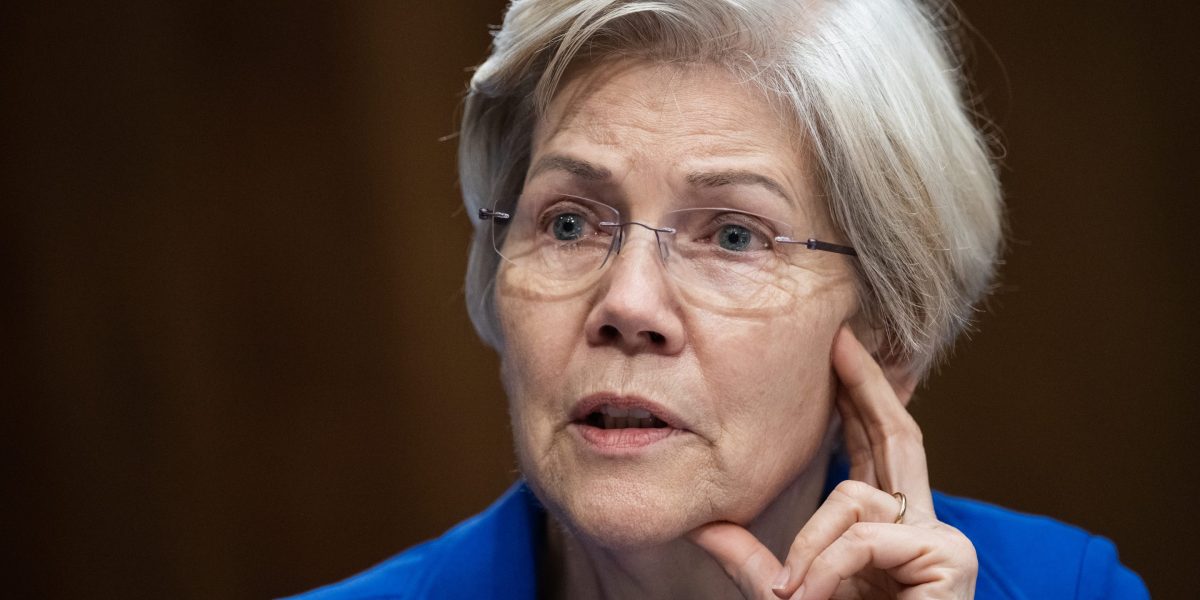Proof of State is the Wednesday edition of Fortune Crypto where Leo Schwartz delivers insider insights on policy and regulation.
The crypto industry loves a villain. Sometimes, the candidate comes from within, if they commit a historic fraud or betray some core Bitcoin orthodoxy. More often than not, blockchain acolytes glom onto an outside figure—think Gary Gensler or Jamie Dimon.
Elizabeth Warren has emerged as the antagonist du jour. The senator from Massachusetts, known for her crusades against big banks, has never been a fan of crypto. Like many Democrats in D.C., she ramped up her criticism in the wake of FTX’s 2022 collapse, introducing a controversial anti-money laundering bill just over a month after the crypto empire’s fall. Early last year, Politico reported that she was building an “anti-crypto army.”
In the past few months, Warren has taken an even more vocal stance, tying digital assets to terrorist financing in the wake of October’s Hamas attacks on Israel and doubling down despite industry pushback over the scale of illicit payments.
In late December, Warren’s offensive seemed to take a personal turn as she sent letters to Coinbase, the leading trade group Blockchain Association, and the think tank Coin Center to inquire about the number of former military and civilian officials, as well as ex-members of Congress, that they employ. “This abuse of the revolving door is appalling, revealing that the crypto industry is spending millions to give itself a veneer of legitimacy,” she wrote.
As I learn as I continue to cover D.C., the politics seen seen in public differ immensely from the politics behind closed doors. Except for the fringes on either side of the political spectrum, legislators and staffers tend toward chumminess, with hyperbolic speech usually aimed more at media attention than ideological purity.
That’s not to say that Warren doesn’t believe what she argues—all evidence points to her being one of the more principled members of Congress, despite what her critics claim. Instead, the inflammatory discourse surrounding her stance on crypto just means that everyone outside of D.C. thinks her office is closed for dialogue.
Last week, a delegate of Massachusetts blockchain entrepreneurs met with a senior staffer in Warren’s office, along with a handful of other members of Congress from their home state. Phil McMannis, the founder of the Boston-based tokenization firm Waev Data, reached out to her office ahead of a planned trip to D.C. with Coinbase’s Stand With Crypto advocacy initiative, not expecting much. Instead, he got a meeting with Warren’s economic policy advisor, Gabrielle Elul. “I was surprised to see they said yes,” he told me.
McMannis, along with the representatives from other crypto companies and a Coinbase lobbyist, laid out their concerns about Warren’s proposed bill to Elul, along with elucidating what they view as the non-financial use cases of crypto, such as health data privacy and creator financial empowerment. Katherine Kuzmeskas, the CEO of Tamarin Health, said that she expressed her concern that Warren’s proposed legislation could make users reveal their personal information if the digital health industry began leveraging blockchain for patients to manage their own health data.
McMannis told me that he was encouraged by the familiarity around crypto that Elul seemed to show, even if she had a “poker face” as they voiced their issues with the bill. Still, McMannis said that Warren’s office was open to meeting and that Elul said the best way for the staff to learn more about the industry was for companies to continue to reach out to the office.
“Senator Warren’s office engages with a wide range of stakeholders with a diversity of perspectives,” a spokesperson said in a statement shared with Fortune. “Enacting stronger anti-money laundering rules for the crypto industry is a top national security priority.”
The meeting likely did not represent a sea change for Warren’s openness to crypto—a Coinbase spokesperson told me that the company’s policy team has met with her office in the past, although they still put out a press release yesterday afternoon trumpeting the delegation.
For McMannis, the takeaway was that everyone is still trying to figure out what’s happening, from entrepreneurs to members of Congress. That’s even more true for the messy process of legislating, despite what the headlines say. “It’s [lawmakers’] job to listen to us and hear our feedback and represent our voices,” he said. “No one’s going to educate them if we don’t.”
Leo Schwartz
leo.schwartz@fortune.com
@leomschwartz
DECENTRALIZED NEWS
A Bloomberg legal analyst is predicting that Coinbase has a 70% chance of dismissing the SEC‘s lawsuit. (Fortune)
A software bug took down 8% of Ethereum‘s validators over the weekend, raising concerns about the operations of the blockchain. (CoinDesk)
The failed crypto exchange Mt. Gox appears to be progressing with its efforts to repay former customers following a decade-old hack. (Cointelegraph)
The top Democrat on the House Financial Services Committee has questions for Meta about recent activity around its blockchain trademarks. (The Block)
The price of Bitcoin briefly dropped below $39,000 as selloff pressure from Grayscale‘s GBTC pushes the cryptocurrency’s correction. (CNBC)
MEME O’ THE MOMENT
Bitcoin’s downward trend is impacting everyone:

This is the web version of Fortune Crypto, a daily newsletter on the coins, companies, and people shaping the world of crypto. Sign up for free.

